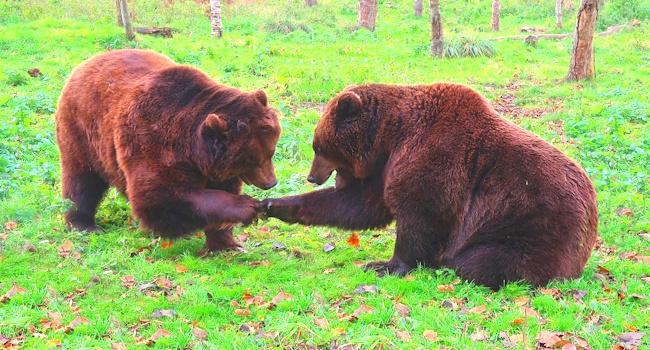🐻 Distribution, Protection & Observation Tips for Tourists
Many holidaymakers associate Greece with sun, beaches and islands like Crete or Rhodes. But the country also has a wild, mountainous side. Especially in the north, there is an animal you wouldn’t expect to find here: the brown bear. Greece is actually one of the few countries in southern Europe where wild bears still live today. In this article, you’ll learn where bears live in Greece, what role they play in nature, how they are protected – and what you should keep in mind as a tourist.
Do Bears Live on Islands Like Crete or Rhodes?
A frequently asked question by tourists is: “Are there bears on the Greek islands?” – The clear answer is: No.
On islands like Crete, Rhodes, Mykonos, Kos Corfu or Santorini there are no wild bears. They occur exclusively on the mainland of northern Greece. There they still find enough habitat in the dense mountain forests and remote valleys.
So if you are spending a beach holiday on the islands, you don’t need to fear encounters with bears.
Where Do Bears Live in Greece? – Distribution and Habitat
The Greek brown bears belong to the species Ursus arctos arctos, which is also found in other parts of Europe. Their range is concentrated in the north of the country, particularly in the regions:
-
Pindus Mountains (Epirus, Western Macedonia, Thessaly)
-
Grammos Mountains on the border with Albania
-
Rhodope Mountains in the northeast, near Bulgaria
-
Smaller populations in remote mountain regions of central Greece
👉 It is estimated that around 500–600 brown bears live in Greece today.
Our Tip
Hotels in Greece are best booked via Booking.com: large selection from guesthouses to resorts, real guest reviews, flexible (often free) cancellation and fair prices.
Conservation Projects – How Greece Protects Its Bears
In the 1990s the population was severely threatened. Poachers, poisoning and road construction took their toll on the animals. Today, the NGO Arcturos plays an important role in protecting the bears.
-
Establishment of bear refuges (e.g. near Nymfaio in Western Macedonia)
-
Rescue of dancing bears that used to be kept in Greece
-
Awareness campaigns in mountain villages
-
Protection of migration corridors so that bears can move between mountain ranges
Thanks to these efforts, the number of bears has recovered over the past 30 years.
How Dangerous Are Bears in Greece?
Basically, bears are shy animals. They avoid contact with humans and usually retreat. Attacks are rare.
Nevertheless, you should follow these rules in bear areas:
-
🚶 Stay on the trails – don’t walk through dense forests.
-
🍖 Don’t leave food behind – food waste attracts bears.
-
🗣️ Make your presence known – by talking or making noise while hiking.
-
📸 Keep your distance – never try to feed bears or photograph them up close.
Bear Watching – Tips for Tourists
Those who want to see bears in Greece need patience and, ideally, local guides. The best chances are in the mountain regions of northern Greece.
Good Places for Bear Watching:
-
Pindus Mountains – hikes through dense forests, many signs of bears.
-
Arcturos Bear Sanctuary Nymfaio – here you can observe rescued bears in a natural environment.
-
Rhodope Mountains – guided nature tours with a high chance of sightings.
👉 Particularly interesting are guided eco-tours, where rangers explain how to track bears (tracking signs, scratch trees, paw prints in the mud).
Insider Tips – Experience Bears in Greece
-
Visit the Arcturos Information Centre in Aetos: Here tourists can learn everything about the history of Greek bears.
-
Combine with wolf tours: Wolves also live in the same areas, and combined tours are often offered.
-
Autumn visits: In late summer and autumn, bears are particularly active because they are looking for food for the winter.
Differences from Bears in Other Countries
In contrast to the large bear populations in Scandinavia or Eastern Europe, the Greek population is relatively small and isolated. Nevertheless, the animals play an important role in the ecosystem:
-
They contribute to seed dispersal (e.g. through berries and fruits).
-
As an “umbrella species”, many other animals benefit from their protection.
Conclusion – Bears in Greece: Wilderness in Southern Europe
Bears in Greece are a symbol of the country’s wild side. They do not live on the well-known holiday islands such as Crete or Rhodes, but exclusively in the north on the mainland. For tourists, the risk is low – on the contrary: those who love nature and adventure can enjoy exciting encounters with these shy animals on eco-tours.
👉 Tip: A trip to the Pindus mountain regions or a visit to the Arcturos bear sanctuary is a perfect addition to a classic island holiday.
